Sep 25, 2024
9 Critical Lessons from "No More Nice Guy"
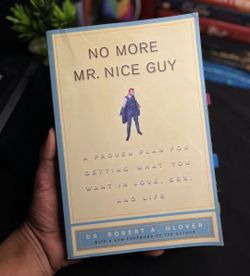
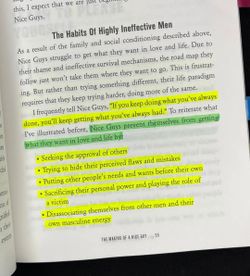
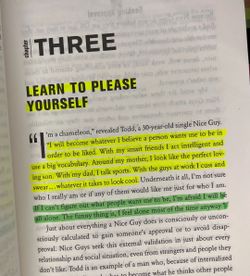
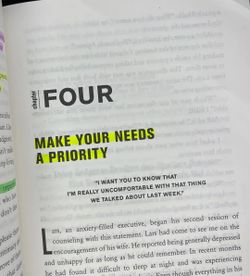
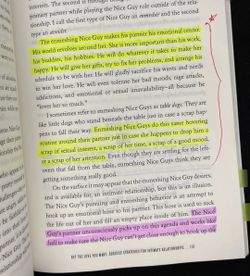
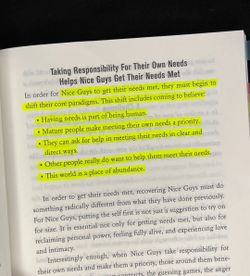
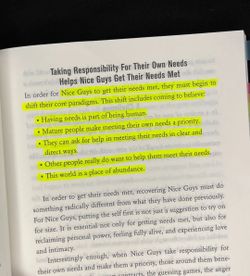
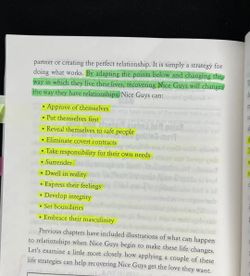
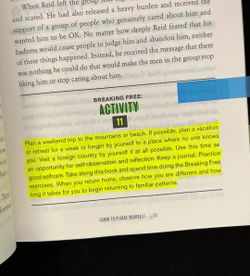

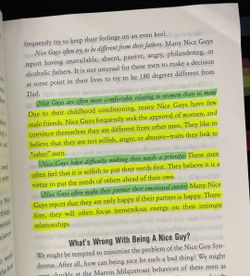
No More Mr. Nice Guy
“I’m a Nice Guy. I’m one of the nicest guys you will ever meet.”
I was proud to make that statement about myself through much of my early adult life. I was a Nice Guy. I wanted to treat people well, and I wanted to be liked. I couldn’t understand why everyone didn’t have a similar personal mantra.
While in my early 30’s, in spite of my unwavering faith in this philosophy, my life was in crises. One marriage had ended. A second one wasn’t going so well. My career dreams were stalled. I was frustrated, resentful, and confused. If you talked to the people closest to me, I wasn’t so nice.
I decided to start working on my situation. I joined a men’s group and started working with a therapist. Honestly, my initial goal was to find out why the people around me weren’t responding so well to my Nice Guy philosophy, and I wanted to find out how to get them to change.
Within a short amount of time, I came to see that the problem was ME. I had an agenda. I had no boundaries. I was indirect. I was passive-aggressive. I wasn’t honest. I wasn’t always so nice.
As I was making these discoveries about myself, I noticed that married men I worked with in my practice as a marriage therapist were making the same kind of statements about their partners that I had been making about mine:
“How come I always seem to give so much more than I get?”
“All I want is to be appreciated. Is that asking too much?”
“I can never do it right.”
“She’s always mad.”
“When will it be my turn?”
“She never wants to have sex anymore.”
I could finish their sentences for them.
Then there were the single guys. The guys who either couldn’t get a date or who were deeply entrenched in the friend zone with the women they desired. These guys helped out and listened to women talk about their problems. They patiently waited, hoping the women they desired would quit lamenting over “jerks” and wake up to see what great men they were. Only to hear something like, “You’re such a great guy. You’ll make some lucky woman very happy some day.”
Over time I came to see, that like me, the road map of these passively pleasing men unconsciously influenced every area of their lives. I came to realize that I wasn’t the only man thinking that if I was just nice, people would like me, they would meet my needs without me having to ask, and I would have a smooth, problem-free life.
In the early 90’s I started my first “No More Mr. Nice Guy” group for these men. We met every other week, and I began writing “chapters” to give them about what I was discovering about the “Nice Guy Syndrome.” As I wrote these chapters, I kept receiving the constant feedback from these men and their partners, “You should write a book, and you should go on Oprah.”
Well, I never made it on Oprah, but I did write the book. Barnes & Noble and Running Press published it in 2003, and it has since been translated into several languages and sold thousands of copies.
Daily, I receive emails from men and women all over the world thanking me for No More Mr. Nice Guy. They tell me how it has changed their lives, and most express the sentiment that they wish they had found it sooner.
No More Mr. Nice Guy
"My partner of a year and a half has just discovered No More Mr. Nice Guy and is working to apply the principles in his life. I read your book this morning—it floored me. I am so grateful that your work is out there to help people, and that my partner was willing to seek insight for himself. This morning, after reading your book, I felt intense relief, validation, anger, sadness, and hope. Thank you for your amazing book—even if it wasn’t intended for me, I was able to gain so much understanding about my life and men in my life from reading it."
Nikki, Boulder, CO (self-described “radical feminist”)
“I’m sure you get lots and lots of e-mails like this, but I’m only on the first chapter of your book, but burst into tears because pretty much everything you wrote about my behavior and examples were true. Its like I'm reading a book about my life. I know it's not an instant fix, but already I feel much better about the direction my life is going, and things seem easier when I'm not trying to make everything "Perfect". Thanks again, as cliche as it sounds, your book truly has changed my life, for the better.”
A.W., Australia
“I came across your book just before Xmas. I am currently reading it for a third time. It is fantastic! Absolutely fantastic. Dr. Glover, your book is one of the best books I have ever read. I am a well read person (two university degrees), and your book is one of the top five books I have ever read. Why, oh why, did I not come across this a long time ago? I could have saved myself a lot of grief.”
Brian, Cusack, St. John's, Newfoundland, Canada
“Finally I found out what I have been looking for. I realized that there was a problem with me a few years back when I got rejected by a girl. Since then I have been reading a lot on low self esteem and other similar stuff. But your book is the ultimate guide. Every single word in the book is true. I can’t thank you enough. Keep it up man.”
Ash, Jowai, Meghalaya, India
"When I first saw the title No More Mr. Nice Guy, I put this book down in haste. I didn't like the title and assumed the book would be too negative or needlessly attacking of women. Then I saw the book on my desk again and opened it. I read the first chapter, then I read the second. As I kept reading I thought, “This is a very important book!” Now that I've finished it, I must recommend it to both men and women. It is insightful and very powerful, and it is very good for marriage. Don't be fooled by the title. This book is about much more than you might think! It is an important addition to our understanding of men, women and marriage."
Michael Gurian, Author of The Wonder of Boys
“No More Mr. Nice Guy is the definitive book for helping men overcome their chronic tendencies to accommodate, acquiesce, and appease their way through life. Dr. Glover knows how to speak to guys, bringing straightforward, funny, audacious, and highly-practical wisdom that teaches them step by step how to be the man they always wanted to be.”
James Rapson, M.S., co-author of Anxious to Please: 7 Revolutionary Practices for the Chronically Nice
"I recommend No More Mr. Nice Guy regularly to my psychotherapy clients. My male clients talk glowingly about the book and often report seeing themselves on every page. Dr. Glover graphically shows why Nice Guys are not altruistic, loving, or empathic. These qualities only appear when men stop following the rules of niceness and start finding out who they are and what they really want and need. Every man and every woman should read this book!"
Anne Stirling Hastings, Ph.D., Author of America’s Sexual Crisis
No More Mr. Nice Guy, Short Review 1
Let's get real: this is a book about men being upset about being treated like women.
Like oh, you don't like having to shove down your feelings and constantly cater to the desires of another gender? That's because it sucks, welcome to womanhood. Maybe the solution isn't more fathers to teach "men how to be men," it's to stop treating women like they exist to fulfill the needs and desires of men. Which yes, is a solution this book works toward but the author doesn't seem to have a whole lot of awareness of how women are raised and how THAT effects men, and how that leads to women raising boys as if they're women. (ie. agreeable, friendly, subservient, etc.)
"Most Nice Guys believe that by repressing the darker side of their masculine energy they will win the approval of women. This seems logical considering the anti-male climate that has permeated our culture since the 1960s."
Most nice girls believe that by repressing the darker side of their feminine energy they will win the approval of dudes. This seems logical considering the anti-female climate that has permeated our culture since always.
But whenever he's not complaining about feminism like it's the problem, abusing the shit out of hyperbole (so much always/never language in this book), ignoring issues with consumer culture, or getting ridiculously Freudian (he repeatedly says that nice guys are monogamous to their mothers), it's actually pretty good.
Because yes, you should act with honesty and integrity and set clear boundaries and learn to recognize that you can't read minds or predict what people really want. I appreciate the whole point that "you are a co-creator in your own dysfunctional relationship." Yup. And yes! Manage your expectations and eliminate covert contracts.
I think probably the most important advice this book gives readers is that you need to put your needs first before anyone else's.
Of course, I'd like to point out the real problem here is codependent behavior which is not actually a problem specific to either gender. I'd highly recommend researching that topic if this book appeals to you. Because this book is pretty inline with the idea that "men are from mars and women are from venus" which is complete horseshit. We are far more alike than we are different. Almost everything he says in this book could be just as useful to women. Men aren't special in their desire to be strong and powerful and all the other things that he attributes to "reclaiming your maleness." Setting each other apart as if were a different species is what contributes to us being so alienated from one another.
And I don't even have a problem with the fact that this book is intended for a male audience. In fact, I think male-only books are important because guys tackle a different set of social problems, but like...maybe think a little harder about why things are the way they are, and don't treat women as a foreign other.
"I frequently encourage recovering Nice Guys to be just who they are, without reservation...The people who like them just as they are will hang around. The people who don't, won't. This is the only way to have a healthy relationship."
Bam. Except he forgot to mention that you should also work on being a better version of yourself because maybe you're kind of awful. Maybe some reservation is warranted until you figure your shit out. Because I could see a special kind of idiot reading that and being like...who I am is an ass-grabber of strangers. It's not just your boundaries that are important.
Anyway, I really wanted to give this book three stars because some of the points in here are really important, but I can't. It needs work.
No More Mr. Nice Guy, Short Review 2
Apart from not using "Nice Guy" in the title (ugh), I wish someone had said to Glover, "You know the part where you compare a man's relationship with his wife to him teaching a dog not to piss on the floor? Yeah . . . don't do that. No, seriously. Don't do that."
God, I wish I was exaggerating:
"For example, if a person gives his dog a treat when he pisses on the carpet, the dog will keep pissing on the carpet. The same is true for humans. If the Nice Guy reinforces his partner's undesirable behaviors, she will keep behaving in undesirable ways."
Also, calling a chapter, "Following The Example Of The Bull Moose Helps Nice Guys Get The Sex They Want." Um, don't do that either. Especially when your advice about sex is actually often awesome:
"Good sex consists of two people taking full responsibility for meeting their own needs. It has no goal. It is free of agendas and expectations. Rather than being a performance, it is an unfolding of sexual energy. It is about two people revealing themselves in the most intimate and vulnerable of ways. Good sex occurs when two people focus on their own pleasure, passion, and arousal, and stay connected to those same things in their partner. All of these dynamics allow good sex to unfold in unpredictable, spontaneous, and memorable ways." (loc. 2369)
All the way through this book contains some great advice for humans learning to deal with other humans in intimate relationships, as well as careers, parenting, negotiating relationships with parents, and life in general:
1 If it frightens you, do it.
2 Don't settle. Every time you settle, you get exactly what you settled for.
3 Put yourself first.
4 No matter what happens, you will handle it.
5 Whatever you do, do it 100%.
6 If you do what you have always done, you will get what you have always got.
7 You are the only person on this planet responsible for your needs, wants, and happiness.
8 Ask for what you want.
9 If what you are doing isn't working, try something different.
10 Be clear and direct.
11 Learn to say "no."
12 Don't make excuses.
13 If you are an adult, you are old enough to make your own rules.
14 Let people help you.
15 Be honest with yourself.
16 Do not let anyone treat you badly. No one. Ever.
17 Remove yourself from a bad situation instead of waiting for the situation to change.
18 Don't tolerate the intolerable — ever.
19 Stop blaming. Victims never succeed.
20 Live with integrity. Decide what feels right to you, then do it.
21 Accept the consequences of your actions.
22 Be good to yourself.
23 Think "abundance."
24 Face difficult situations and conflict head on.
25 Don't do anything in secret.
26 Do it now.
27 Be willing to let go of what you have so you can get what you want.
28 Have fun. If you are not having fun, something is wrong.
29 Give yourself room to fail. There are no mistakes, only learning experiences.
30 Control is an illusion. Let go; let life happen.
There is nothing in that advice that applies only to humans gendered as male. Neither is there when Glover points out it's important to have strong friendships outside of a relationship. No-one can be everything for a person.
It's the whole framing of masculinity that fails with this book. This isn't unique to Glover, it's true of our culture as a whole. Here's Glover's definition of masculinity (loc 1524):
"I define masculinity as that part of a man that equips him to survive as an individual, clan, and species . . . Masculinity empowers a man to create and produce. It also empowers him provide for and protect those who are important to him. These aspects of masculinity include strength, discipline, courage, passion, persistence, and integrity."
Seriously? What the hell is left for a definition of femininity? The part of a woman that equips her to give in and give up, fracture social groups to be more easily consumed by predators, to consume and destroy, that empowers her to steal food from her babies' mouths, and use them as handy portable shark decoys in case of danger?
There's not one quality in Glover's list that isn't a definition of any self-actualized human, regardless of chromosomes. We'd all get along a lot better if our culture stopped enforcing a gender binary that says, "Men are all of these things," rather than, "Good people are all of these."
Glover also includes stuff that had my stomach turning. Like how important it was for the sick 12-year-old girl to get lots of male attention from "her guys." This gave me flashbacks to A Child's Life: Other Stories when the stepfather says what's really important to a prepubescent girl is her relationship to men (cue sexual abuse).
Or the way Glover always talks about the "availability" of women for sex, or how a teenage boy's ambition is "securing a girlfriend and someday having sex..." As if women are a sex accessory, and not human beings with their own desires.
This seems really inconsistent with the sound content in some of the sections.
So, yeah, I have no idea how to rate it. My reaction varies wildly from a 1 for the way Glover seems to regard women, to a 5 for advice about drawing boundaries and being true to oneself. I'm going with a 3, comprised of 2 stars for OK overall, +1 star for my favorite line of the book: "This story is consistent with Alan's lifelong avoidance of vaginas." (loc 2132).
No More Mr. Nice Guy, Short Review 3
This was a must read for me and made me realize the struggles and ordeals a "Mr. Nice Guy" goes through in all phases of his life. This book resonated with me because I was a Nice Guy throughout my high school years and early college life. I didn't understand back then why I was getting rejected by women, why I was settling making friends with people I didn't like, and why I felt afraid to get into arguments with my family. I knew the Nice Guy life was painful, but I thought that was the right way to live to be a well-rounded man.
Robert A. Glover dealt head on about the misperception that being a Nice Guy will get you anywhere in life. He defines a Nice Guy, as any man or boy who has ever called himself that, is exactly what the term means when a girl says it in explaining why she is friends with a guy, but not attracted to him. It is the term referring to a neighbor who is willing to do any favor but who never seems to have his own affairs in order. It is the guy who always tries to please, but who people never seem to want to hang around anyway, or if they do, it’s only because he tries to do everything for everyone. He is an easy target for jokes because he smiles and takes it, never thinking of defending himself because he is afraid of conflict, thinking that if he just plays along, he will be liked.
Glover goes into a lot of detail about this, but two of the most important traits of Nice Guys is that they seek to win the approval of others (especially women) by anticipating their needs, and they try to minimize or deny their own needs. Glover traces this first problem to a generation of men raised almost exclusively by women. After the 50s, fathers spent much more time away from home, working, and the home became the domain of the woman. Teachers in recent years have been almost exclusively female. Thus, a generation (now two) has grown up with no significant male role models and a strong disposition to winning the approval of female authority figures. Women raised these men, so you’d think they would be great with women, and women often describe Nice Guys as “a real catch for some (other) lucky woman.” Turns out, however, that women don’t actually like men who constantly try to please them.
Nice Guys are so keen on winning approval because they are afraid of being abandoned as a result of childhood difficulties. Thus, in addition to trying to please others, caretake, and anticipate needs, Nice Guys avoid conflict like the plague. They believe that if they just fit in with everyone, don’t make any waves, never get negative attention, then others will want to be around them. Thus, they never stand up for themselves. Thus, nobody like them anyway. Their answer: try harder.
The other big aspect of Nice Guys is that they try really hard to deny their own needs. This manifests in things from career aspirations to sex. Nice Guys think that, if they can be completely needless, then they will cause no trouble for others, won’t be competition, won’t make any demands, and will be liked. The problem is that they have to get their needs met somehow and too often they resort to passive-agressive behavior or build up a lot of resentment. It’s actually pretty illogical when you spell it out, but I know it’s how a lot of men think and behave, because I did.
The real value of the book lies not in describing the Nice Guy Syndrome, but rather in providing a roadmap for men to break free of the thought patterns and behaviors that are holding them back. The old idea of manliness held that men should be assertive, confident, brave and have the self-assurance to follow their own path without trying to please everyone around them. Glover sprinkles his book with exercises for men to try in their journey to overcome their problematic thinking. The exercises range from thought experiments, to list-making and goal setting, to things like “do one thing for yourself every week.”
The stories of men’s trials, tribulations, and triumphs truly is inspiring. We read of men who are so paralyzed by their fear of abandonment (disguised as a sense of responsibility to their family) that they let their wives walk all over them. When they start standing up for themselves, setting boundaries, their wives initially balk, but suddenly find themselves for assured of their husband’s love, more respectful, and more attracted to him. They appreciate the relationship more and find it gives them greater value as well.
This goes into a lot of the psychology of attraction and male-female interactions, but the point of the book is often that women want to be with a man, not some male-shaped stand-in who lets her call all the shots. This willingness to give the woman all the power does not make a woman feel secure in her relationship.
I really appreciated the writing of this book because it does a lot to give definition to that murky middle ground between pushover and jerk, that combination of assertiveness, consideration, self-efficacy that used to define manhood, but has since fallen prey to…I don’t know what (Glover offers a number of reasons including those aspects of the feminist movement that cast a lot of positive masculine traits as oppressive). There’s the good lead dancer, then there’s the guy that is too passive to lead well, and the guy who just shoves women around on the dance floor; the first is assertive, the third is insensitive and obnoxious, and the second is just as frustrating to dance with (I was also that guy, and I know women don’t like dancing with men who do that). I myself am still coming to grips with this vision of manhood, but so far, it has proven to be a truly liberating and empowering experience. My friends like me more, women find me more attractive, and I like myself more. Instead of losing friends because I bother to argue my point of view, instead of driving women away because I look after my own needs, instead of alienating professional contacts because I assert my presence, I now assure people of my ability to stand firm in my convictions and to take care of myself. I know, these things are obvious to anyone on the outside, but to someone who has believed his whole life in the lies of the Nice Guy, it’s kind of an eye-opener.
I highly recommend this book to anyone, male or female, who wants to understand either the dynamics of male self-empowerment, or the ways men and women interact and fill unique roles in a relationship. If you know a Nice Guy who can’t understand why he never gets what he wants in life even though he tries so hard, please, please save him the agony and get him this book.
No More Mr. Nice Guy, Short Review 4
The basic premise of Glover's work is established on the existence of a phenomena known to the author as 'The Nice Guy Syndrome'. According to him, because many men as children did not get their 'needs met in a timely, judicious manner', their minds have been conditioned to believe that they are the cause of this inadequacy; that they are not worthy of what they want, nor are they capable of getting it. He also argues (agreeably, I think) that the increasing absence of fathers in the lives of their sons since World War II contributes to this poor conditioning, as well as the increasing prevalence of women as authority figures in a similar trend. Children, he asserts, are less inclined to know what it means to be men due to a distanced relationship with their dad, and learn techniques and behavior suited to winning the approval of women. These are usually manifested in what would colloquially be known as being a 'goody-goody' or 'suck-up', attempting to be worthy of praise and approval from an authority figure, who in this case is almost universally female. According to the author, in addition to believing that they were responsible for or unworthy of their 'needs' (which in some examples are quite less than needs, strictly speaking), these children were chastised for any behavior which went against the inclinations or desires of their authority figures, and subconsciously make the connection that it is this disappointment that they have caused that is responsible for their not 'getting their needs met in a timely, judicious manner' (the phrase is used several times verbatim), despite this not necessarily being the case at all.
Because of this, as they grow up and face the world as adults, their default tendencies and mechanisms of behavior yield further disappointment. In every facet of their life, the same method is employed, and the conclusion reached; to suck up, and then believe that everything is your fault when this does not work. In this way, the 'Nice Guy' is only superficially nice, using his favors and pleasantness as currency for his own selfish ends. The book is littered with examples of people who are 'stuck' at an undesirable job, in broken or otherwise dysfunctional relationships, or even from pursuing the life that they desire in general.
Thus runs the essential diagnosis of the work. One of my greatest complaints is that the book's methods for healing these wounds is none other than the common sense derived from an honest five-minutes' devotion of thought to the problem. Really, most of these issues are simple in nature, at least insofar as they have been presented, and in every instance, some basic application of initiative and common sense is the solution. We hear of people who are in bad relationships with their wives or girlfriends, and who try to win sex and their love through buying them gifts or doing their chores for them, and feel trapped when this yields an opposite result. The amazing thing is that when these people consulted the advice of our professional, qualified author, their solution was simply to announce their intentions and ask them to have sex, which almost always worked in the cited examples. This effect is commonplace: people who were promised a raise upon their graduation and were then denied it and feel stuck in their job are told to quit their job and pursue a career where their qualification would ensure better success. There are many who are 'stuck' in tight situations, and who are miraculously rescued by this same combination of common sense and initiative.
The way that the book is written is also unimpressive. I was expecting much more psychological analysis and scientific content, but instead (and to my surprise) was presented with something resembling a continuous 'Dear Abby' newspaper column, or a bunch of stuff pulled off of Yahoo Answers and other such sites of questionable repute. The author claims that it took him six years to write this 100-something page, large-type compendium of self-help web articles and therapeutic 'Breaking Free' activities thrown about throughout. The whole work is literally a continuous list of these problems within different facets of life (though they are all the same fundamentally), the same solution I do not mean to be excessively contentious, but I honestly have a difficult time believing that this kind of a work requires a PhD to write. Perhaps he is truly incapable as an author, but otherwise, there is no way that a PhD in this field can devote six years to writing a book of this nature and come up with something so cheap and predictable, or else he gives his field and his degree a bad name.
There is also an abundance of strange, New-Age 'kookiness' strewn here and there throughout. Whether this takes the form of 'feeling the energy of the universe' or a therapeutic exploration of one's self through 'healthy masturbation' (with no goal or aim in mind), this book certainly fits the 'quack' stereotype quite well. He also flips between the working imperative of 'it's up to you, just do it' and the passive 'it's all your environment and conditioning's fault - remember, you did not get your needs met in a timely, judicious manner!', and does this often, giving the book an annoying, bi-polar mood which presents the author in a more confused light than his patients. The blind cannot lead the blind.
Neither is this book concerned with living an honorable, respectable life, or about the meaning of manhood in general (though it is intentionally dedicated to men): it is nothing but an obvious diagnosis, and equally obvious application of initiative and common sense aimed at gratifying one's desires (labelled as 'needs') at any cost. The righteousness of the end aside, the book is devoid of all scientific information and analysis, and the means employed are nothing beyond the basic usage of the will and the mind.
This is a genre that I will not return to for some time. Expecting something vastly different, I was very disappointed. I suppose that my conception of living in the right manner differs greatly from many others (judging from the popularity of this book), but I will stick to studying the lives of great men to satisfy that objective. Adventure, honor, courage, dignity; these are the qualities that I seek to aspire to (and those which true manhood espouses), and in this sad book I found them not.
No More Mr. Nice Guy, Short Review 5
LOVED THIS BOOK! Maybe because for a good portion of my life I've been a Perennial "Nice Guy". I'd recommend this book in a heartbeat to more people than I can name. And Ladies, before getting nervous that this book implies "How to be a Jerk", it totally isn't. On the contrary this is a book about how "Nice Guys" have, through long post-modern cultural indoctrination, lost their voice and how to get it back.
This is a book written by a Therapist, not a Macho-Womanizing-Player. Dr. Robert Glover has studied what he dubs "The Nice Guy" syndrome for years. Nice Guys are males who have mastered living in Cognitive Dissonance. They are the most creative Dishonest people around. On the outside they can appear to have everything, a decent job, a nice home, a good family, but underneath it all these males are falling apart. What the false appearances don't reveal is an individual who is completely unable to admit to themselves that they are basically miserable. The problem is two fold, first that they don't see their own misery, and 2nd they don't know what is causing it.
Another term that could be used to accurately describe this phenomenon would be "Self-Deception".
The author explains how this cultural development came about. For generations boys learned from their fathers about how to be men by working alongside them in the fields. When society became urbanized this took men away from the home and left boys to be raised by their mothers. With Teachers also being primarily women, boys were growing up having to learn about how to be men from women. This of course led to some internalized distortions of what that meant. From vindictive women who wanted to teach their sons to not be "like" their father to women who merely could not understand boys' overly physical and disruptive behavior, women did what they knew best and raised boys to be and act in ways more similar to women. This of course creates an endless list of identification problems for boys when they come of age.
The root problem with Nice Guys is this, they crave more than anything else to simply be accepted and loved, a natural human need, but they go about it backwards by placing other's approval of them above their own approval of themselves. Thus they are like the perpetual child who does everything just right to try and please "mommy and daddy' so that they will love him. They grow up into perpetual people pleasers placing the mercy of their own internal well being on other people and their opinions of him.
Dr. Glover argues that the "Nice Guy" is the guy who because he has lost his "voice" resorts to passive aggression, dishonesty, and evasion all the while saying that he is fine and perfectly happy. Underneath, however, he is seething and miserable and doesn't understand or know why. Nice Guys are the guys that everyone can take advantage of, you can ask them for anything and they will give it up, they are easily exploited, they volunteer for everything. All the while they are only craving to be accepted.
Luckily there is a way out of this warped way of being. Integration, the root of of which "integer" means "whole". Integration meaning "to be whole". These men simply have to reclaim their lives, establish personal boundaries, stop living for the approval of others, do things for themselves and quit avoiding conflict. As they develop that relationship with their masculinity they will grow in personal Courage, Strength and Mastery. The fastest way for males to achieve this is by hanging out with other males. Only men can help other men learn to be true to themselves and live in line with their inner masculinity.
No More Mr. Nice Guy, Short Review 6
Characteristics: According to this book, “Nice Guys” have a set of personality traits that they need to change in order to improve their lives. They think of themselves as doing everything “right,” giving to other people, taking care of other people and trying to help other people by fixing other people’s problems. But underneath the surface, they actually are desperately seeking approval from others, especially women. A Nice Guy’s life revolves around trying to please a woman and make her happy. Nice Guys are more comfortable relating to women than men. They are trying to avoid conflict, trying to hide their own flaws and mistakes and repressing their feelings. They have difficulty making their own needs a priority, and they make their partners their emotional center. They act like helpless, whiny, wimpy, needy victims, instead of taking control of their lives.
Causes: Nice Guys tend to have had absent fathers, and they try to be the opposite of their fathers. The problem is that they tend to be the opposite extreme, which is just a different kind of craziness. Nice Guys are monogamous to their mothers – they don’t become independent from their mothers after puberty. Nice Guys have feelings of abandonment from childhood that they have never let go of. This leads to toxic shame, the belief that there is something wrong with them, and the only way to get approval from others is to hide aspects of themselves that they think are bad. People who try to be perfect children grow up to be Nice Guys. Nice Guy syndrome started when boys started to grow up without men in an educational system dominated by women, and when certain anti-male attitudes became widespread (men are pigs, men are rapists, a woman needs a man like a fish needs a bicycle).
Covert contracts: Nice Guys believe they are giving, but they are only giving in order to get something in return. Nice Guys think: if I can hide my flaws and become what I think others want me to be, then I will be loved, get my needs met, and have a problem-free life. When this doesn’t work, Nice Guys try harder, instead of doing the opposite. They think that if they are mostly good, they build up credit so that they will get a pass when they screw up. They try to be low maintenance, but they have a “covert contract.” If I’m nice to her, she’ll owe me, and she’ll do nice things for me. “I will do X for you, so that you will do X for me. We will both act as if we have no awareness of this contract.” Rather than just being nice with no strings attached, and directly asking for what they want, Nice Guys hide what they need and what they want. Caretaking means focusing on someone else’s needs in order to feel valuable, rather than trying to get your own needs met. Healthy people are caring but focus on getting their own needs met.
Compartmentalization: Nice Guys believe themselves to be honest, but they are actually dishonest and secretive. They compartmentalize their secret lives from the persona they try to project. They are not integrated, because they don’t accept both the good and bad aspects of themselves. They are isolated, passive-aggressive, full of rage and addictive. When they feel ashamed, they try to deflect the shame onto others by becoming defensive and pointing out the other person’s flaws. They build up walls (addictions, sarcasm, isolation), instead of letting it all hang out. They don’t realize that people are not drawn to perfection. People are drawn to shared interests, shared problems, and an individual’s life energy.
Co-creating dysfunctional relationships: Nice Guys have difficulty with intimacy, because they are attracted to people with problems who need fixing. They give in to their partners’ dysfunction by also being dysfunctional themselves. They become enmeshed in the relationship at the expense of doing the things that make them happy.
Copulation: Nice Guys are dissatisfied with their sex lives. Nice Guys think that sex is a pill that will take away loneliness, cure boredom, alleviate feelings of worthlessness, smooth over conflict, create feelings of being loved, relieve stress and generally solve all personal problems.
Careers: Nice Guys are only relatively successful, because they are underachievers, afraid to leave jobs even when they aspire to do something else.
Stop being a Nice Guy. Do the opposite:
Nice Guys should stop seeking the approval of others and make their own needs a priority. They should be giving with no strings attached. They should develop integrity and be honest. They should stop trying to hide their flaws and just allow themselves to be human. They should express their feelings. When they screw up, they should not defend, explain, excuse and rationalize (DEER); they should just admit they screwed up. They should ask for help when they need help. They should stop expecting life to be smooth and free of conflict.
A Nice Guy needs to believe that it’s okay to be a guy. He should hang out with other guys. He should be masculine. He should be comfortable around other guys. He should believe that other guys are not jerks. He should have male friends. He should build meaningful relationships with other men, not disassociate with other men. He should not be a loner. Men have strength, discipline, courage, passion, persistence and integrity. They can also be aggressive, destructive and brutal. Nice Guys should not repress the fact that they possess these traits.
If a Nice Guy’s wife is depressed, angry all the time and has no interest in sex, and if he feels like he’s constantly walking on eggshells trying to make sure he doesn’t do anything to upset her, he should “surrender.” That means he should accept what he cannot change and realize that everything will be okay even if the relationship fails to be what he wants it to be. He should think of this life experience as a “gift” that gives him the opportunity for self-improvement. In general, a Nice Guy should accept reality, instead of trying to change what he cannot control. He should act as if the thing that’s bothering him is a gift that will spur him to learn from his mistakes. Other things the author advocates: Masturbate without using any fantasy or pornography. Say no to bad sex; don’t be a “bottom feeder.” Consider going on a sexual moratorium for up to six months. Stop trying to please your wife in order to get more sex.
The author’s specific advice: Find safe people who can give you support, and then reveal yourself to the safe people, including your secrets, your dark side, the things you’re ashamed of. Stop hiding things. Figure out what happened during childhood that made you feel not OK. Don’t act pleasant, unselfish, gentlemanly, sober, healthy, nice, respectful, inoffensive and good in order to get approval from others – these are attachments. Act like you don’t care whether others approve of you, and stop hiding your imperfections. Act like people would still love you even if they saw your imperfections. Act as you would if you were not trying to please other people. Stop trying to be good in order to get validation from others. Do something for yourself. Tell yourself positive affirmations, such as “people love and accept me just as I am.” Take a vacation by yourself to a place where no one knows you, and be yourself. Spend a weekend putting your own needs first. Act like people want to help you get what you need. Stop entering into covert contracts. Stop caretaking, and start caring (giving with no strings attached). Be aware of “victim pukes” from the frustration of the other person not fulfilling their obligations in a covert contract: cutting remarks, embarrassing the other person in public, being critical, withdrawing, letting frustration build up until you blow up. Stop trying to do things right, play it safe, fix problems, not rocking the boat, stop being charming and helpful, stop being low maintenance, stop being controlling and manipulating, withholding information, repressing feelings, avoiding problems and difficult situations. Tell people how you feel, but not in a way that is critical of the other person; no one else is to blame for the way you feel. Confront your fears that prevent you from acting with integrity and convince yourself that you can handle it. Set boundaries regarding when you’re going to not put up with something and learn how to say “no.” Don’t tolerate intolerable behavior just to avoid conflict. Hang out with other guys, and stop seeking the approval of women. Stop neglecting your body; take care of yourself. Imitate healthy, masculine guys and visualize being one. Develop a realistic picture of what your father was like; how he failed to act as a male role model. Act as a role model yourself by doing guy stuff with your sons or other boys in your life. Reinforce good behavior from your partner and stop rewarding bad behavior, just like you would with your child. Don’t settle for bad sex; bad sex is worse than no sex. Realize that you have to meet your own needs; no one was put into this world to meet your needs but you. Don’t stay in a boring, unfulfilling job. Do what you want to do. Don’t settle for mediocrity. If there’s something you want to do, but you are afraid to fail, go ahead and do it anyway as if you knew you would succeed.
Well, I'm definitely not the archetypal "Nice Guy," but I can see what he's talking about. Good book. I think a book like this shows the limitations of the DSM. I bet this author has helped a lot of people, but obviously being a "Nice Guy" is not on the list of mental disorders.
No More Mr. Nice Guy, Short Review 7
The book provides a clear diagnosis of the "Mr. Nice Guy" syndrome and reveals you the truth about it: "Mr. Nice Guy" is not nice at all. In fat, "Nice Guy" is a misnomer. The "Nice Guy" utilize manipulation and covert contracts to achieve what he wants, rather than being direct and properly articulating his needs. "Mr. Nice Guy" is not satisfied and utilizes methods that only backfire on himself. Fortunately, the author provides some solutions.
The key methods to stop being a "Nice Guy" are as follows:
1. Articulate your needs clearly. Do not utilize manipulation to achieve what you want. You need a clear communication channel in your relationships.
2. Having boundaries and saying "No" are not poor qualities; instead, they are highly respectable qualities. People are attracted to those who know themselves well and establish clear boundaries. If someone is a pushover then who is that person really? They have no boundary to construct their identity with.
3. Establish self-justice. "Nice Guys" can peek into other relationships and identify the issue; yet they cannot see the issues when they are in it. "Nice Guys" need to step back and determine whether they are being fairly treated from a third-person perspective. They need to understand having needs and fulfilling those needs are not poor qualities.
The book receives three stars due to its repetitive nature and emphasis of "Nice Guy" syndrome where it may not apply. It is best to complement this book with negotiation books such as "Getting to Yes" to understand how to fulfill your needs based on sound principles. You do not want to setup faulty boundaries or have unrealistic needs. You need to focus on your principles and use them to "negotiate". When you learn how to negotiate, learn to identify "Nice Guys", read a couple of other books on self-empowerment, then you are ready for your metamorphosis from the "Nice Guy" to the "Confident Gentlemen"!
No More Mr. Nice Guy, Short Review 8
I'm going to be completely honest and say that I had a slight aversion to the title of this book. The use of the term 'Nice Guy' in common discourse is usually an irritating (if not downright dangerous) misnomer for self-righteous, one-dimensional men. These men are usually moralistic and entitled 'victims', waiting for someone to tell them that it's alright to be ineffective and destructive because they've earned it as their personal experience suggests that being accommodating is unrewarding.
Robert Glover has met these people, too, and even admits to being one before writing this book. He most consistently refers to the topic of 'toxic shame' that brings about an overwhelming urge to be accommodating. What follows is a systematic explanation on the destructive effects of men being ashamed to be genuine about their needs, with very concrete (albeit anecdotal) examples and relevant action points.
If you're very sensitive to gender politics, I have to advise you that this book extrapolates on the societal and parental climate around the Nice Guy phenomenon. But let's be clear: this book has nothing to do with exerting power over people of either gender; it is all about taking responsibility for every aspect of your own life. In saying that, I got the most insight from this book because I didn't see it as a political statement: I saw it as a compassionate attempt at counselling people from a person who has learned from his own mistakes. And I, for one, am really grateful for the help.
By undefined
21 notes ・ 56 views
English
Intermediate